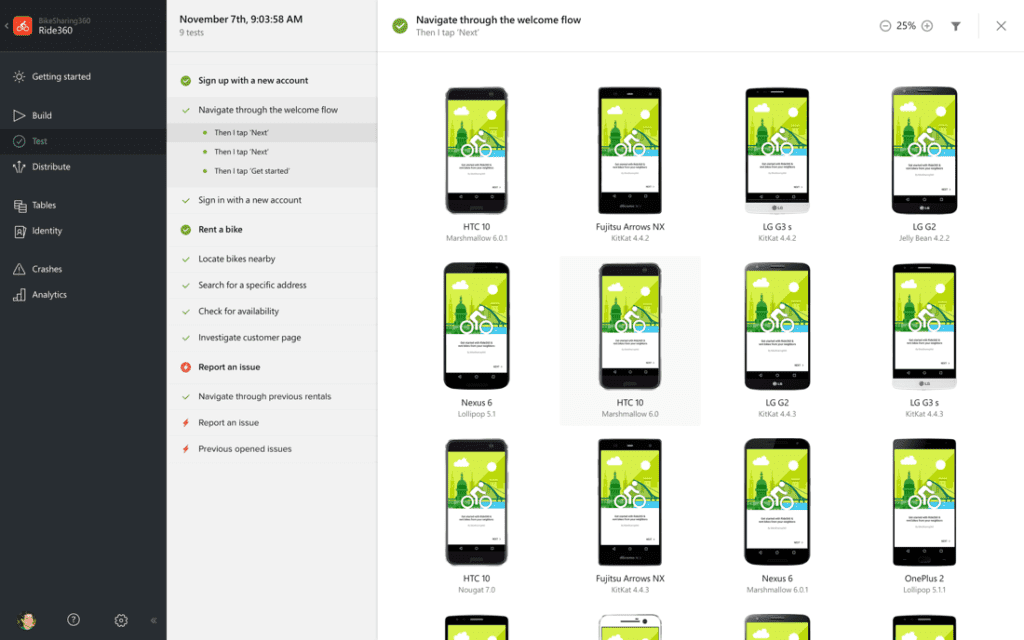Mobility Meets DevOps: An Overview of Microsoft Studio Visual App Center
Microsoft’s Visual Studio App Center threads DevOps processes with mobile application development. Companies that benefit from the ease of collaboration between its software and operations teams may find that Microsoft Visual Studio App Center streamlines the best DevOps has to offer into an intuitive interface. In this blog post, I provide a general overview of Visual Studio App Center and its best features.
As companies continue to push out mobile applications that meet business needs and streamline processes, the software development lifecycle can pose a complex and pressing challenge. This is where DevOps comes into play. DevOps (a compound word meaning “development” and “operations”) is a software development and delivery process which facilitates the communication and collaboration of software developers and operation professionals. The four pillars of DevOps are continuous integration, testing, distribution, and monitoring.
If you’re just getting into the DevOps arena, you will find a wide range of options. In this article, we review a new, simple and powerful product from Microsoft to meet your DevOps needs: Visual Studio App Center. Visual Studio App Center is an end-to-end DevOps solution currently gaining traction for mobile applications.
App Center is the byproduct of two powerful tools that handled some, but not all, aspects of DevOps: Xamarin Insights and HockeyApp. App Center covers many aspects of the DevOps process, but this article focuses on the fundamentals, and why they matter for businesses and developers. Specifically, we will cover: testing, distribution, continuous integration, analytics, and crash and event reporting.
Testing in Visual Studio App Center
Developers will be able to test hybrid and native apps across multiple devices via Xamarin Test Cloud. With the power of Xamarin Test Cloud backing App Center, developers have a sea of devices to choose from and run automated tests concurrently for fast results. This will provide insight into where errors may arise within the user interface of the apps based on the test reports.

Credit: The Visual Studio Blog
Distribution with Visual Studio App Center
App Center supports the distribution of pre-production app binaries for iOS and Android, and production release for Android by connecting your application to the Google Play store. Creating groups of beta testers is configured by first establishing a group and then adding, or removing, testers by email. From there, you can easily upload the app binaries ready for testing and release them to groups accordingly. If distribution was cumbersome before, App Center’s distribution will be a real time saver.
Continuous Integration
App Center allows you to connect to a number of popular repositories such as GitHub, BitBucket, and Visual Studio Team Services to configure a build for debug and release. This is a beneficial feature when continuing development for an app that has already been released. Linking your repository enables you to do builds of merged branches/commits and test for any errors before completing the final build and release of your app. Time is critical when developing, so knowing when and where problems surface early-on is crucial to the overall efficiency of the software development life cycle.
Analytics
Some of the metrics being offered in App Center analytics are:
Focusing on which devices are being used, how often, and by region can greatly impact direction on which devices to focus on or which region to cater to. Such usage analytics can provide insights on ways to improve service to users and increase usage for current and future apps.
Crash & Event Reporting in Visual Studio Mobile Center
Crash reports are available as stack traces and can be logged as part of events (only temporarily, as this is not how they are intended to be logged or tracked). Events can easily be tracked and monitored to provide feedback on which features and areas are most used and frequented by users. This type of crash and event reporting allows developers to quickly assess issues and rectify them, post go-live, as well as determine which areas should be prioritized for future enhancements.
Visual Studio App Center provides some of the essential DevOps processes in a simple and effective portal. Although I’ve provided a brief overview here, I hope it shed just enough light to understand how each cloud service module works and what value each provides. To further explore App Center functionality, be sure to check out Microsoft’s Visual Studio App Center YouTube channel.
There’s more to explore at Smartbridge.com!
Sign up to be notified when we publish articles, news, videos and more!
Other ways to
follow us:



